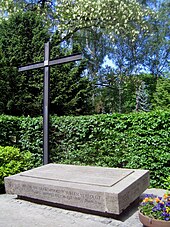Richard Kuenzer

Richard Kuenzer (born September 6, 1875 in Freiburg im Breisgau ; † April 23, 1945 in Berlin ) was a German lawyer and diplomat . He was involved in the resistance against National Socialism and was murdered in 1945.
Life
Richard Kuenzer was the son of the Freiburg factory owner Heinrich Kuenzer. In 1893 he passed the Abitur in Freiburg. He then served as a one-year volunteer before he began studying law in 1895 and graduated in 1898 in Freiburg . This was followed by a position in the judicial service of the Grand Duchy of Baden before he became a candidate for a consular career in the Foreign Office in 1902 . In 1903 he completed his doctorate in Freiburg, from 1904 to 1914 he worked at the consulates in Paris , Cape Town and Zanzibar . During the First World War he was in the military for a year and after a short time as electoral consul in Lugano , finally consul in Drama ( Macedonia ). There he came into British captivity, from which he was released at the end of 1919. This was followed by a position as head of department in the Foreign Office until November 1921, which was followed by the management of the consulate in Innsbruck . On September 9, 1923, Richard Kuenzer was put into temporary retirement.
From 1925 he was co-editor of the daily Germania , which was close to the Center Party , of which he was a member. On July 18, 1933, Richard Kuenzer was given final retirement.
At the end of the 1930s he came into contact with resistance groups against the Nazi regime, such as the Berlin Solf Circle . The informer Paul Reckzeh , who had been smuggled into the Solf district by the Gestapo , arranged for Kuenzer's arrest, and later he was imprisoned in the Ravensbrück concentration camp .
On December 14, 1944, Kuenzer was expelled from retirement because of his involvement in the events connected with the assassination attempt on Adolf Hitler on July 20, 1944. On the night of April 22nd to 23rd, 1945, he and 15 other prisoners of the Lehrter Strasse cell prison were killed . a. Klaus Bonhoeffer , Wilhelm zur Nieden and Rüdiger Schleicher - murdered by a shot in the neck by a special command of the Reich Security Main Office in Berlin.
Commemoration
The Catholic Church has Dr. Richard Kuenzer was accepted as a martyr in the German Martyrology of the 20th Century in 1999 . On August 9, 2014 , a stumbling block was laid in front of his former home, Berlin-Westend , Ulmenallee 29 . A street is named after him in his native Freiburg.
literature
- Uwe Schellinger: Death of a "peace addict". To the biography of Dr. Richard Kuenzer (1875-1945). In: Freiburg Diocesan Archive. 119, 1999, ISSN 0342-0213 , pp. 427-433.
- Helmut Moll (publisher on behalf of the German Bishops' Conference), witnesses for Christ. Das deutsche Martyrologium des 20. Jahrhundert , Paderborn et al. 1999, 7th revised and updated edition 2019, ISBN 978-3-506-78012-6 , Volume I, pp. 299-303.
- Maria Keipert (Red.): Biographical Handbook of the German Foreign Service 1871–1945. Published by the Foreign Office, Historical Service. Volume 2: Gerhard Keiper, Martin Kröger: G – K. Schöningh, Paderborn et al. 2005, ISBN 3-506-71841-X .
- Siegfried Mielke (Ed.) With the collaboration of Marion Goers, Stefan Heinz , Matthias Oden, Sebastian Bödecker: Unique - Lecturers, students and representatives of the German University of Politics (1920-1933) in the resistance against National Socialism. Lukas-Verlag, Berlin 2008, ISBN 978-3-86732-032-0 , p. 328 (short biography).
Web links
- In remembrance , published by the Federal Foreign Office in January 2011 ( Memento from January 15, 2012 on WebCite ) (PDF file)
- Colonial Collections Freiburg: Edgar Dürrenberger: Freiburg and Africa. Part II: Wilhelm Winterer, Richard Kuenzer and Georg Nathan. In: Freiburg-Postkolonial
- Short biography of the German Resistance Memorial Center
Individual evidence
- ↑ In remembrance , published by the Federal Foreign Office in January 2011 ( Memento from January 15, 2012 on WebCite ) (PDF file)
- ^ Hugo Ott: End of the idyll. University and city of Freiburg in the summer semester of 1944. In: Nils Goldschmidt (Hrsg.): Economy, Politics and Freedom. Mohr Siebeck, Tübingen 2005, ISBN 3-16-148520-3 , p. 65
| personal data | |
|---|---|
| SURNAME | Kuenzer, Richard |
| BRIEF DESCRIPTION | German lawyer and diplomat |
| DATE OF BIRTH | September 6, 1875 |
| PLACE OF BIRTH | Freiburg in Breisgau |
| DATE OF DEATH | April 23, 1945 |
| Place of death | Berlin |
